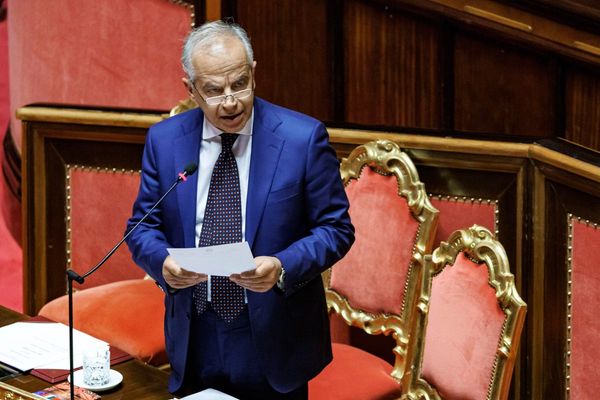
A secretive “review” by the Department of Finance has paved the way for PwC Australia’s partners to unlock the profits from tens of millions of dollars of taxpayer contracts over the past decade.
The Department of Finance’s “review” and subsequent greenlighting of “PwC’s Indigenous Consulting” (PIC) vastly improves the saleability of the business, which PwC is reportedly offering around the market.
PIC CEO Gavin Brown has previously told The Klaxon PIC has “never declared or paid a dividend”.
That means the profits from its $45 million-plus in federal government contracts since 2013 — including $13.78 million in 2022 alone — remain inside the entity, and will flow to PIC’s owners upon sale.
The likelihood of a sale — although it hasn’t happened yet, company searches show — is greatly improved by Finance’s shock greenlighting of PIC, announced the same day as $711,554 in new federal contracts.
PIC is 49% owned by PwC Australia (and so PwC Australia’s partners) with the remaining 51% owned by Brown (35%) and former public servant Selwyn Button, both Indigenous.
That structure allows PIC to be given “limited tender” federal contracts intended for small Indigenous businesses (“at least 51%” Indigenous ownership is required).
Government procurement site AusTender shows that since PIC was created it has been given “limited tender” contracts — meaning the work is not offered to others — worth over $10 million.
PIC is almost entirely dependent on taxpayer funds, the vast majority via federal contracts.
In March last year, with the federal government under intense public pressure over the PwC tax leaks scandal, Finance issued what was reported as an “effective ban” on PwC.
PwC “divested its government business”, of 1,400 PwC partners and staff, for $1 to private equity group Allegro, which rebranded it Scyne Advisory.
On May 2, as exclusively revealed by The Klaxon and Crikey, Finance quietly issued a new “procurement policy note”. It not only opened the door to PwC again being given federal contracts — and as soon as December 1 — but stated that Finance had conducted a “review” into PIC and had given it the all clear.
“Finance has … concluded a review into PwC Indigenous and found that it was appropriate for the Commonwealth to continue engaging with PwC Indigenous,” it states.
Finance provided no further information. It is refusing to release the “review”, to say who at Finance conducted it, how long it took, or even what specifically it looked at or found.
In October last year, like PIC, Finance greenlit Scyne Advisory to be given federal contracts. (The PwC-Allegro “sale” was finalised the next month).
Yet in direct contrast to the PIC review, Finance released its findings, publishing a 24-page document: “Finance’s review of the ethical soundness of Scyne Advisory”.
As previously revealed, the secretive PIC “review” was “finalised” just days before the Senate inquiry into PwC was to make public its findings on PwC after an extensive, year-long probe.
The 48-page report, titled “PwC: The Cover-up Worsens the Crime”, found PwC Australia was engaged in an ongoing “cover-up”, had failed to “genuinely change” and made “no genuine effort to fully investigate and address the issues”.
Department of Finance secretary Jenny Wilkinson is refusing to explain why Finance gave PIC the green light immediately before the detailed Senate report was due to be made public.
Wilkinson, who receives a taxpayer salary of $765,916, also refused to comment when asked whether she had approved the decision to greenlight PIC.
It has further emerged the Albanese government has given Wilkinson’s Finance “responsibility for managing the Commonwealth’s response” to the PwC scandal.
Finance’s May 2 “procurement policy note” states that is to “ensure a coordinated and efficient approach across the Commonwealth”.
“Finance has taken responsibility for managing the Commonwealth’s response … and forming a whole of government view on PwC Australia’s ethical soundness,” it states.
That means it will be Finance — via another of its “reviews” — that decides whether the Australian government will once again award contracts to PwC Australia, as early as December 1.
Last week, the ABC followed our exposes regarding the greenlighting of PIC and Finance opening the door to new PwC Australia contracts.
Finance also refused to provide the ABC with its PIC “review”.
Citing The Klaxon and Crikey’s expose, the ABC report said a Finance “spokesperson” had provided it with the following response: “The Department has not released a summary of its examination of PricewaterhouseCoopers Indigenous Consulting.
“Finance’s examination found that PIC exhibited a significantly different governance and operating structure to that which exists within PwC Australia, with a greater focus on transparency and that PIC has the appropriate structural and cultural standard”.
Since the PwC tax scandal broke, PwC — and later Finance — have claimed PIC is “separate” to PwC.
That’s despite PIC’s name — “PwC’s Indigenous Consulting” — that it’s based in PwC’s Sydney headquarters, that its has PwC partners for directors, and it sharing PwC’s website.
Finance has provided no evidence to back its claim that PIC has a “significantly different governance and operating structure” to PwC; its claim that PIC has “the appropriate structural and cultural standard”; or its claim that PIC has a “greater focus on transparency” than PwC.
The value of PIC is difficult to determine. That’s in large part because the entity — despite receiving tens of millions of dollars in taxpayer funds — is not required to file annual accounts.
The Klaxon has asked Brown to provide a copy of PIC’s latest annual report in the interests of “transparency”.
Brown refused.
PIC was founded in 2013 by Luke Sayers, who was PwC Australia CEO from 2012 to 2022 and so for the entire tax leaks affair.
Last year it was revealed PwC Australia took confidential tax policy data — gleaned while providing advice on preventing multinationals avoiding Australian tax — and used it to create schemes to help multinationals avoid Australian tax.
A criminal investigation by the Australian Federal Police remains ongoing, as does a string of investigations by government’s Tax Practitioners Board, as well as investigations by US authorities.
There is no suggestion that any members of PwC Indigenous have been or are involved in the ongoing investigations around the tax leaks matter.
On March 17, citing The Klaxon’s previous PIC exposes, The Australian Financial Review reported PwC was seeking buyers for its 49% PIC stake.
“Unlike the $1 phoenix-y move to offload the firm’s government business to Allegro to set up Scyne advisory … Burrowes and PwC Australia want a more market-appropriate sum for the stake, assigning the Business Recovery Services team to assess its value,” the paper wrote.
Finance appears to have been assisting PwC in its sale plans, behind-the-scenes, as early as mid-March.
The companies register shows PwC is yet to sell any of its stake in PIC.
PwC remains the biggest owner of PIC (49%), followed by Brown, who owns his 35% stake via his company Validus Private Wealth, and Button (16%).







